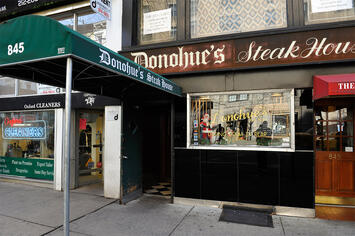
From the outside, Donohue’s Steak House looks like it belongs to another era—and maybe that’s part of its charm. Nestled on Lexington Avenue on Manhattan’s Upper East Side, its faded green awning and dated décor stand in quiet contrast to the sleek storefronts and chain eateries that now dominate the neighborhood. Donohue’s doesn’t try to impress. In fact, it looks slightly out of place.
But step inside, and something different unfolds.
There’s a hum to the room: clinking glasses, laughter from regulars, waitstaff who know your drink before you sit down. It’s not trendy or curated—it’s lived-in. And it’s always full. Donohue’s doesn’t just serve steak—it serves memory, comfort, and the rare feeling of being known in a city that too often insists on anonymity.
I’ve eaten at Donohue’s many times over the years. It’s an authentic third place—not home, not work, but the vital space where community lives. Donohue’s earned that role through consistency and care. The food is solid. The atmosphere is sincere. And if you show up enough, someone nods in recognition. A few visits later, you’re greeted by name. Just like that, a restaurant becomes a home base.
That’s what’s at stake now. After 75 years, Donohue’s is considering closing when its lease ends in 2026. Owner Maureen Donohue-Peters recently opened a second location in Westhampton Beach and is “pondering” whether the original spot will remain open.
She’s candid about the reasons. One of them is crime. A rise in burglaries and break-ins in the neighborhood has shaken her confidence and sense of safety. When a multigenerational business owner begins to fear for the well-being of her staff and space, it’s not just a personal concern—it’s a civic failure.
If New York City wants institutions like Donohue’s to survive, it has to make safety a real priority, not just a talking point.
That challenge sits alongside another: the slow grind of economic and cultural pressure that makes it harder for legacy businesses to stay afloat. Even after surviving real estate booms, blackouts, and a pandemic, Donohue’s may not outlast the next lease negotiation. And that should be a wake-up call.
Because Donohue’s isn’t just a steakhouse. It’s an anchor. A space of belonging in a city that can feel transactional and cold. These are the places that sustain a city’s soul—not just its economy. They are where friendships form, loneliness is softened, and civic trust is built, quietly, over years.
You don’t legislate a third place into existence. You nurture it. You protect it. You ensure it isn’t priced out, pushed out—or left vulnerable to crime and disorder.
New York has long celebrated small businesses and neighborhood institutions in rhetoric, but too often fails them in practice. When a place like Donohue’s begins to consider closure—not for lack of customers or community, but because the city around it no longer feels safe or supportive—it’s time to reexamine our priorities.
Read the rest of this piece at AEI.
Samuel J. Abrams is a professor of politics at Sarah Lawrence College and a nonresident senior fellow at the American Enterprise Institute.
Photo: Donohue's Steak House on Lexington Ave., NYC - by Jazz Guy, via Flickr underCC 2.0 License.












